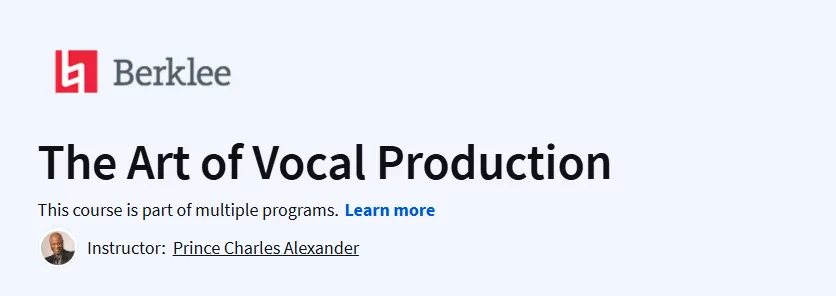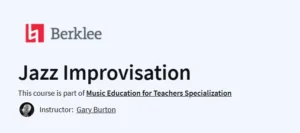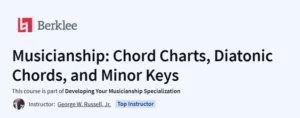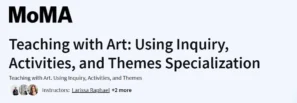What you will learn in The Art of Vocal Production Course
- Professional vocal recording techniques
- Microphone selection and placement
- Vocal comping and editing workflows
- Pitch correction and tuning (Auto-Tune/Melodyne)
- Essential vocal effects processing
- Doubling and harmony creation
- Vocal production for different genres
Program Overview
Vocal Recording Fundamentals
⏱️ 2 weeks
- Covers studio setup, microphone types (condenser/dynamic), and vocal booth acoustics.
- Includes proximity effect experiments.
Vocal Editing
⏱️ 2 weeks
- Focuses on comping best takes, breath control editing, and crossfade techniques.
- Features DAW (Pro Tools/Logic) workflows.
Vocal Processing
⏱️ 2 weeks
- Teaches EQ, compression, de-essing, and reverb/delay applications.
- Includes parallel processing demonstrations.
Advanced Techniques
⏱️ 2 weeks
- Examines creative effects, formant shifting, and genre-specific processing (pop vs. R&B vs. rock).
- Features artist case studies.
Get certificate
Job Outlook
- Professional value: Essential for producers/engineers
- Salary potential: Vocal specialists earn 50−150/hr
- Industry demand: 15% growth in audio production roles
- Certification benefit: Berklee alumni network access
Explore More Learning Paths
Elevate your vocal performance and production skills with these curated programs designed to enhance your technical expertise, creative output, and understanding of the music production landscape.
Related Courses
The Business of Music Production Specialization Course – Learn how to navigate the music industry, manage projects, and market your vocal productions for professional success.
The Technology of Music Production Course – Explore the tools and techniques for recording, editing, and mixing vocals in modern music production environments.
Electronic Music Production Specialization Course – Develop advanced skills in electronic sound design, vocal processing, and digital music production workflows.
Related Reading
Enhance your creative process and performance efficiency:
What Is Performance Management? – Understand how structured improvement strategies and consistent feedback can refine your vocal production skills and artistic output.
Specification: The Art of Vocal Production Course
|
FAQs
- You’ll explore vocal recording fundamentals, including microphone selection (e.g., condenser vs. dynamic), placement, and navigating vocal booth acoustics.
- You’ll learn vocal editing workflows—comping best takes, breath editing, and using crossfades effectively in DAWs like Pro Tools or Logic.
- The course covers processing techniques such as EQ, compression, de-essing, reverb/delay, and parallel processing to enhance vocal tracks.
- You’ll gain training in creative voice effects and genre-specific production strategies—for pop, R&B, rock, and more—including formant shifting.
- You’ll also dive into advanced tools like Auto-Tune, Melodyne, pitch correction, time compression/expansion, Elastic Audio, and vocoder effects.
- The curriculum is organized into four themed modules, each lasting approximately 2 weeks:
- Vocal Recording Fundamentals
- Vocal Editing
- Vocal Processing
- Advanced Techniques
- Overall, expect the course to take about 11–12 hours in total.
- You’ll complete six assessed assignments, including hands-on vocal projects and peer review components.
- The course allows flexible, self-paced learning with lifetime access—perfect if you’re balancing a busy schedule.
- Subtitles are available in multiple languages—including French, Portuguese, Russian, Spanish, and English—boosting accessibility.
- Yes! The course is advertised as Beginner level—no prior vocal production experience needed.
- Basic access to a DAW (Digital Audio Workstation)—like Pro Tools, Logic, or free tools—is highly recommended to perform exercises.
- You also need recording capability, whether your computer’s built-in mic or an external one with audio software like Audacity or GarageBand.
- Quality headphones or studio monitors are encouraged for precise listening and mixing.
- If you’re unsure about gear or setups, reviews like those on Course Eye provide excellent clarity on what’s needed.
- The course is taught by Prince Charles Alexander, a respected professor at Berklee College of Music and an experienced audio engineer.
- Offered through Coursera, a platform known for high-quality learning in partnership with top institutions.
- Widely embraced by learners—over 41,000 enrolled, with a strong 4.7 average rating from over 350 reviews.
- Recognized as a top-rated audio production course, noted for helpful content and practical examples.
- Positive learner feedback highlights the course’s effectiveness: Reddit users say it offers a solid overview of vocal production, and it’s “free to take (just not for a certificate).”
- Yes—you’ll get a shareable certificate of completion if you opt for the paid track.
- You can audit the course for free, accessing most content but without certificate eligibility.
- Financial aid and a free trial are typically available, helping those with budget constraints.
- You’ll enjoy flexible deadlines and lifetime course access, making it easy to complete on your own schedule.
- Even without completing graded assignments, the course offers plenty of learning value for improving your vocal production craft.





